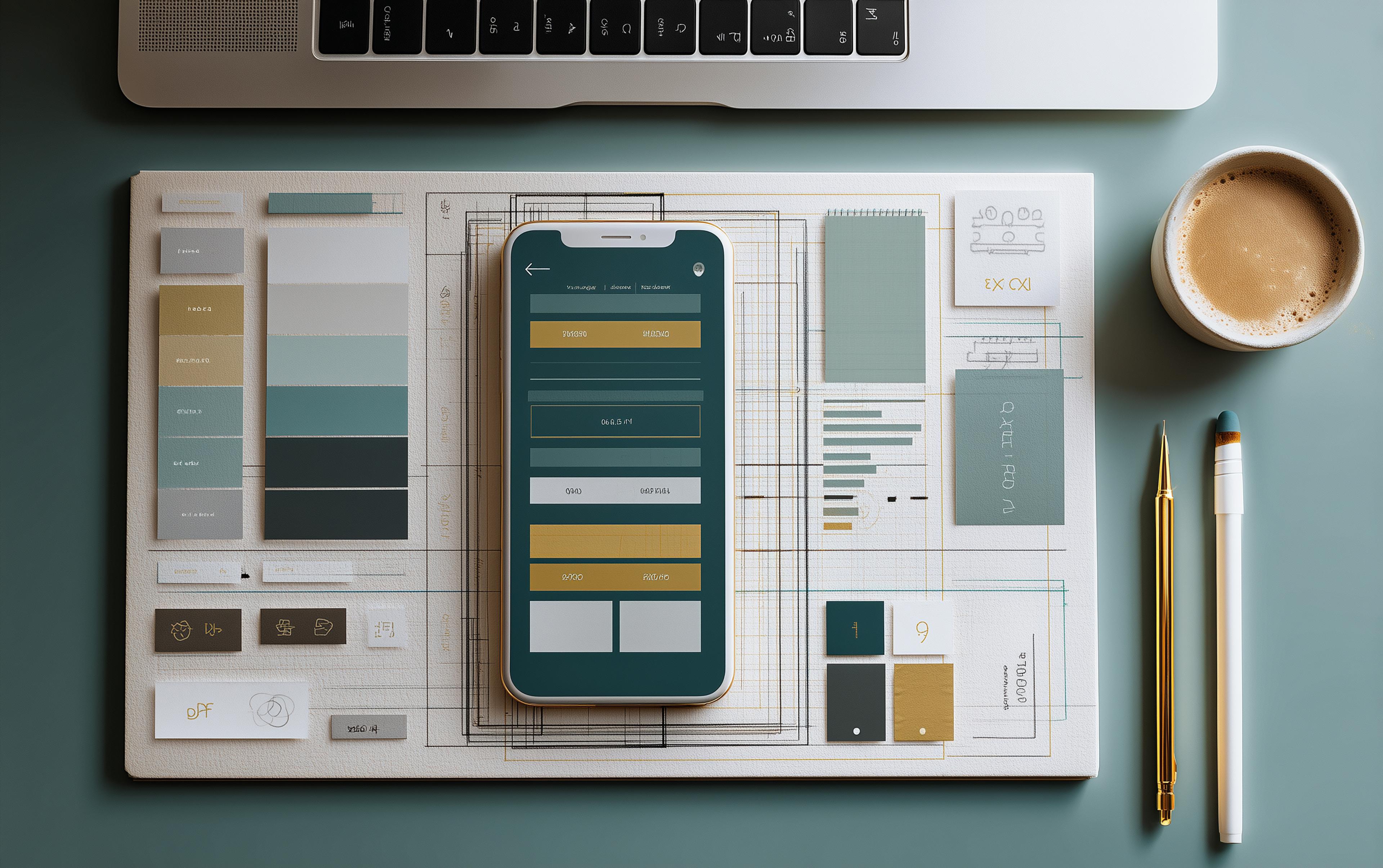Becoming digitally visible
Today, individual web design is more important than ever in order to position yourself clearly in the digital competition. A customized website not only reflects the uniqueness of your brand, but also offers flexibility and full control over functions and content. In this article, you will learn why custom web design offers many advantages over standard templates, how the process works with a professional agency and what you should look out for when making your choice. We also explain how responsive web design and modern web apps can make your online presence even more effective.
Why customized web design?
Unique, flexible & under your own management
Customized web design offers numerous advantages over ready-made templates. Firstly, it ensures uniqueness, as a customized website reflects your brand identity down to the smallest detail. While templates often appear generic and have a similar appearance to numerous other websites, a custom design creates a distinctive look that builds trust and increases recognition value.
At the same time, an individual solution allows a high degree of flexibility: functions and layout can be adapted exactly to your requirements - whether special contact forms, individual user guidance or special design elements. A template often quickly reaches its limits here, whereas a customized design remains precisely tailored to you. Based on this, you can also set up your own content management system (CMS), which offers you complete design freedom. With an in-house programmed CMS, you can maintain content yourself at any time, implement new design variants or add modules without being limited to prefabricated theme structures.
Visible growth & planning
Another decisive advantage is SEO optimization. Individual websites are designed from the ground up with search engines in mind: clean code structures, optimized meta data and targeted performance optimizations (such as fast loading times and responsive layouts) ensure that search engines rate your site better. This leads to more visibility in search results and increased organic traffic. You also benefit from greater scalability: as your business grows, a customized website can be easily expanded. New functions, additional landing pages or comprehensive integrations (e.g. in CRM, ERP or marketing tools) can be implemented retrospectively without having to completely rebuild the existing system.
Safe & intuitive
Security and maintainability are also advantages of custom web design: as only required functions are built in, the attack surface for hackers is reduced and updates can be installed more quickly. With template-based development, unused plugins or scripts often carry unnecessary ballast that makes the system more vulnerable. With an individually programmed site, developers retain a full overview of all components, making it easier to identify and rectify problems. Last but not least, a tailor-made web design also improves the user experience: targeted usability tests and optimized user paths ensure that every visitor can find their way around intuitively - an aspect that can only be implemented to a limited extent with standardized templates.
Overall, the use of customized web design leads to a clear differentiation from the competition, better rankings, higher conversion rates and lower operating costs in the long term. If you are looking for a solution that not only fits today, but also tomorrow, there is no way around customized web design.
How a web design agency works
Kick-off
For the launch, the client and agency sit down together - in person or virtually - and jointly determine which business objectives the new website should support, which target groups are to be addressed and which functions are absolutely essential. The budget, time frame and internal resources are also defined. This briefing is the foundation on which all further steps are built.
Concept
The agency uses the kick-off findings to develop an initial blueprint: page hierarchy, navigation logic, basic visual motif and central features such as forms or store modules are described in detail. Mock-ups or clickable wireframes make the idea tangible at an early stage so that you can provide targeted feedback. In this way, the concept matches the brand identity and user needs precisely before a pixel is programmed.
Implementation
As soon as the concept is approved, the production phase begins. Designers transfer the wireframes into final layouts, define colors, typography and imagery, while developers implement the front end responsively and connect the back end with all functions. Regular reviews - often in two- to three-week sprints - ensure that design details, texts and technology progress in sync.
Quality check
An intensive test phase follows before the go-live. The site is checked under real load conditions, tested on various devices and browsers and all functions - from the contact form to the payment process - are run through. Any bugs found are fixed immediately, performance is optimized and accessibility is checked so that visitors have a trouble-free experience later on.
Launch & Maintenance
After passing the tests, the website moves to the live server, DNS entries are updated and an SSL certificate ensures encrypted connections. But the collaboration doesn't end there: the agency monitors loading times, installs security updates and takes care of regular backups. This ensures that your website remains secure, fast and up-to-date in terms of content.
The role of a website agency
Their team develops an appealing, user-friendly design, programs all functions and ensures that the site runs smoothly on every device. At the same time, the agency takes care of SEO optimization so that content is easily found by search engines and your visibility increases sustainably. It also remains active after the launch: through regular maintenance, security updates and fast support, it guarantees that the website always remains up-to-date, secure and appealing. To ensure that all of these components work together seamlessly, it is advisable to choose a website agency that offers not only the technical development but also the web design itself from a single source - this creates a consistent user experience and a presence that will impress in the long term.
Tip for the right agency
Under the best conditions, the website agency is also the web design agency and can therefore deliver design, development, SEO optimization and ongoing maintenance from a single source with a holistic approach - efficient, brand-compliant and future-proof.
Criteria for selecting a website agency
When choosing a website agency, it is worth systematically checking off a few core criteria. Experience and portfolio come first: take a close look at reference projects, check whether the agency has already mastered comparable requirements and pay attention to design quality such as clean code. This will give you a realistic picture of what the team can actually achieve.
Customer reviews and testimonials provide an equally clear indication of reliability. If previous clients make the same positive comments - such as punctual delivery, proactive advice and solution-oriented support - you can assume that your project is also in good hands. If there are no testimonials or they are mixed, you should exercise caution.
When it comes to the price-performance ratio criterion, you should pay less attention to the pure final price and more to the overall "life cycle value". Clarify which services are actually included in the offer. Ask about payment modalities (milestone or monthly billing) and license costs for third-party software to avoid surprises later on. A good agency will explain transparently how their fee is made up, point out ongoing hosting and maintenance costs and provide examples of the concrete ROI their work has achieved in comparable projects. This not only gives you a price, but also a sound basis for estimating the actual equivalent value.
In the end, communication often determines the success of the project. Pay attention to how quickly the agency responds, whether fixed contact persons are named and how feedback loops are organized. Open, transparent communication ensures that ideas are implemented efficiently and that your website can go live on time.
Responsive web design - get the most out of your website on all devices
What is responsive web design?
Responsive web design means that your website adapts flexibly to different screen sizes and devices - whether smartphone, tablet or large desktop monitor. The layout, images and text automatically adapt so that everything is always easy to read and clear. Users no longer have to zoom or scroll sideways, but can navigate through your site comfortably and intuitively. This technology ensures that your website has a uniform and appealing appearance on every device.
Advantages of responsive web design
One major advantage of responsive web design is that it is easy to maintain: you only need one website that works on all devices. This saves time and money, as there is no need to create or maintain a separate mobile version. In addition, search engines such as Google prefer responsive websites as they offer users a better experience. This has a positive effect on your ranking and increases the visibility of your site on the web. For visitors, a responsive website means a pleasant browsing experience - they stay longer, use more pages and are more willing to interact with your offer.
What should you look out for?
For your website to be truly responsive, you should make sure that the design adapts seamlessly to all screen sizes. Navigation should be just as easy and clear on small devices as on the desktop, and all important content must remain visible. Fast loading times are also important so that users are not frustrated by long waiting times. In addition, images and text should be scaled automatically without sacrificing quality or readability. This ensures that every visitor - regardless of device - has an all-round positive and smooth user experience.
Web apps as a better alternative
What is web app development?
Web app development refers to the creation of applications that run directly in the web browser and do not require installation on the device. These web-based programs are platform-independent, meaning they work equally well on smartphones, tablets and desktop computers. This flexibility means that individual business processes can be digitally mapped and made accessible on the move without users having to download special software. Web apps are therefore a modern solution for making company processes more efficient and user-friendly.
Advantages of web apps for companies
Web apps offer numerous advantages: they are available at any time and from anywhere, as they only require internet access and a browser. Compared to conventional, native apps, web apps do not have to be installed or updated individually on each device, which saves time and money. In addition, updates are installed centrally on the server and are immediately available to all users. By using modern technologies, web apps can be adapted precisely to the specific requirements of a company, which makes them particularly flexible and scalable. In this way, they help companies to optimize processes, reduce costs and provide their customers or employees with innovative digital solutions.
Conclusion
Individual web design is the basis for a successful, future-proof website that is tailored precisely to your needs and those of your target group. It creates trust through uniqueness, improves the user experience through flexibility and ensures better visibility with well thought-out SEO. In combination with responsive web design and modern web apps, it offers companies a powerful tool to grow in the digital space. Choosing the right agency is crucial for success - a partner who is not only technically adept, but who will also accompany and support you in the long term. This way, you don't just get a website, but a sustainable digital solution that grows with your company.



